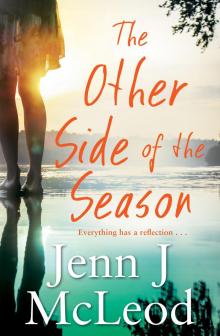- Home
- Jenn J. McLeod
Simmering Season Page 9
Simmering Season Read online
Page 9
Maybe the only way to avoid the fall was to jump.
12
‘Where’s Fiona?’ Maggie asked her son as he joined her at the permanently reserved staff table in the corner of the dining room, a special spot under one of only two operating ceiling fans. ‘Isn’t she eating?’
Noah shrugged, his head bowed over the giant bowl of pasta, his fork twirling long strands of spaghetti carbonara. He twirled, stopped, stood the fork upright, then let it fall to the rim of the bowl with a clunk—repeating the manoeuvre twice. By the second clunk Maggie sensed trouble.
‘You usually love Ethne’s pasta. Not hungry tonight?’
Another shrug—the internationally recognisable symbol of adolescence. Was it Maggie’s imagination or were her son’s shrugs becoming more frequent since their visitor’s arrival? Fiona clearly had an honours degree in shrugging.
Two years ago, when Noah had been going through a tough time at school, shrugs had been the answer to every question. Too easily back then, Maggie had dismissed her son’s moods as nothing more than a boy pushing through puberty, when it was actually a school bully pushing him around, leaving her once outgoing son withdrawn and moody. It saddened rather than surprised her that high school dynamics nowadays meant a challenge for the studious, the shy and the not overly sporty. Those who, like Noah, opted for more creative courses such as art and music seemed to be prime targets for bullies. Nothing had stirred Maggie’s ire more than when her son had come home with the occasional torn shirt and grazed knee. At the time, he’d shrugged the incidents off and insisted it was nothing he couldn’t handle himself. With Brian badgering her to let him, she’d reluctantly agreed. This fresh batch of petulance she’d been witnessing of late had Maggie’s mind kicking into overdrive, sorting through the million other possible teenage son problems and hoping none of them had anything to do with Fiona.
The girl hadn’t been in town that long and already Maggie was looking forward to the days Noah was at school. Only two years ago, a clumsy and slightly gawky fifteen-year-old Noah had needed a nudge to make new friends in town, yet he seemed to have hit it off straight away with Fiona, spending way too much time in her company. Too bad the last person Maggie wanted her son hitting it off with was a spoilt city girl who spent her days sitting around in the beer garden playing with her fancy phone and driving around the town in her fancy car. Seventeen-year-old boys, even good ones like hers, were too easily impressed and usually by all the wrong things.
Unable to stand the clunk of the fork for the third but who was counting? time, Maggie intercepted the utensil. ‘Please Noah, quit with the fork thing, okay? What’s wrong, buddy? What’s worrying you?’
There followed a few seconds of silence, her son staring down at his untouched dinner, long enough for a disconcerting lump to form in Maggie’s throat.
‘Did you and Dad want me?’ Noah asked the bowl. ‘I mean, like, was I planned?’
‘Were you …?’ Maggie gulped, almost gagging on the mouthful of pasta. ‘Of course,’ she quickly added, followed by a strategic sip of lemon squash. Two more sips and she could blame the sparkling, ice-cold liquid for her hand grabbing at her palpitating chest. ‘Oh, bubbles,’ she spluttered, trying to stall, to think, to focus. She silently coached herself in the controlled breathing the midwife had encouraged her to use throughout labour—In through the nose, two, three. Out through the mouth, two, three—knowing the only thing Maggie was about to give birth to right now was a nine-pound lie. ‘Of course you were planned. Why would you ask such a thing?’
Another shrug, followed by the clunk of a falling fork for the fourth bloody time. Maggie wanted to scream—or run. Maybe run then scream. But there was more of this dinner to get through first.
More shrugs.
More moody silence.
More clunking forks.
She had the sudden urge to drive the prongs of that bloody fork into the back of her own hand. The pain of that was preferable to having this conversation with her son.
‘For goodness sake, Noah. Put the fork down and talk to me. Tell me what this is all about?’
Clunk.
Huff.
Slump.
So much like his father.
An exaggerated huff and puff amply conveyed Brian’s exasperation most times as well. He was calling twice a day now to talk—make that argue. The second call was usually to apologise—a substitute for the puppy play and lovemaking that had once worked a treat when Maggie was angry. This afternoon’s call had ended with another tantrum—Brian’s. He was becoming more demanding than a five-year-old, when what Maggie needed was a partner to carry some of the load, share the financial and emotional burden, and to deal with their son’s awkward questions.
‘Noah? I asked you a question. What would make you think you weren’t planned?’
‘Because I know that stuff happened in your day.’
‘My day?’
‘Yeah, you know, condoms and stuff weren’t around like they are now. So girls got themselves pregnant.’
Girls got themselves pregnant? Maggie was glad she’d finished her dinner because her throat had seized up, along with her mouth and her brain. Where was he going with all this? Did she want to know?
‘Go on.’
‘Fi and me were talking this afternoon. She said she was a mistake and that her mum didn’t really want her. Her mum sent her away to school and they didn’t talk for a long time. Then her mother walked out. We moved out here and I hardly talk to Dad any more and …’ Noah shrugged, a sweat breaking out and mingling with the downy fuzz on his top lip. It seemed so incongruous—the clash of a man in the making, yet still a child in need of his mother’s reassurance. If this phase of her life wasn’t so bloody problematic Maggie might have enjoyed the opportunity of watching her son’s manly metamorphosis.
‘Will a smuddle help?’
‘Muuum!’
For the first time in sixteen years, the Lindeman version of a cuddle had failed her. Noah remained silent, his gaze fixed on his over-poked pasta.
‘Listen to me.’ She reached across the table, prised the fork out of his fingers, placed it on the plate—without the clunk—and rested her hand on his. Left to stare at the zigzagged parting on the top of his head, she tried to explain. ‘No one has sent anyone away and no one’s walking out. You and I are here for Pops and to sell the pub.’
‘But it’s not selling.’ Eye contact restored, she could see they were red and glistening. ‘And Fi and I were talking—’
‘Fi-ee-eee …?’ Maggie dragged the name out, her vocal chords taking the little moniker on a quick rollercoaster ride to add more resentment than she’d planned. ‘Fiona doesn’t know everything, Noah. The sale’s taking longer than we expected, that’s all. What else has Fiona been saying? She doesn’t know anything about us or our family and I don’t want you—’
‘Chill, Mum, geez! I was talking about it. She hasn’t said anything.’ He balanced the chair on two back legs and looked at Maggie. ‘Actually, that’s not true. She never shuts up.’ He grinned and Maggie felt some relief. ‘Most of the afternoon she talked about herself and her problems. Some problems. I wouldn’t mind a few of them.’
‘Really? I can’t think what.’
‘A car like hers would be a pretty cool problem. A flat with a view of Bondi Beach would be a major problem, too. She’s, like, got one of everything. Double bummer.’ He grinned.
‘She doesn’t, you know. She doesn’t have what we have.’
‘You mean two parents?’
Maggie faltered. ‘You do have both of us, Noah. Dad’s just not here at the moment. Fiona has a father too. Phillip loves her very much. I’m hoping while she’s here her grandmother will help Fiona see what a good man Phillip is.’
Noah let the chair drop back onto all four legs. ‘Fi went to see Mrs Bailey today.’
‘She did? I’m glad. That’s what her coming out here was all about. Eat please, Noah.’
‘You reckon
that’s really why she’s here?’
Noah slurped spaghetti into his mouth, Maggie’s own fork hovering at her lips while she contemplated her son’s question.
‘What do you mean?’
‘She keeps going on about her real father, like he might live here or something. Does he?’
‘I don’t know anything about that.’
That wasn’t exactly true. Maggie knew enough. In fact, she almost knew too much about the night Amber had fallen pregnant. Knowing which version was the true version was the tricky bit. Jack Bailey’s was the loudest account—and the most unlikely. For months after, the town’s tongues didn’t stop wagging, not even when Jack whisked his daughter away to Sydney to marry her off. For a while no male under forty was safe from suspicion. Amber’s so-called rape was a major scandal for a small town. Poor Will and his family had suffered the most.
Maggie wondered if Phillip knew Fiona was poking around in search of a father and whether she should let him know. She immediately closed her mind to the idea. Maggie’s pot of problems was already full to the brim, any more and it might boil over.
‘Let’s not make Fiona’s trouble our trouble, Noah. Who her real father is has nothing to do with us. Okay?
‘So, about Dad …’
‘What about Dad?’
‘If he’s so busy and he’s always working, how come we don’t have more money to buy cool stuff?’
‘It’s a contract job, Noah.’ Maggie couldn’t believe how quickly and how easily her lies formed. ‘Contract jobs can mean payment only once the work is completed. Until then we have to make do.’
‘Or until we get a buyer,’ Noah corrected.
‘Yes. That’s what I meant.’
She could see her son considering her explanation. How she wished she’d never abided by that ridiculous i-ICON confidentiality clause, as if she couldn’t trust her son to keep a secret. Explaining to Noah now that the contract Brian signed did not allow her to tell him the truth would only suggest she hadn’t trusted him, or considered him grown-up enough. Telling Noah the truth after all this time would expose her lies. Was he smart enough and mature enough to understand that sometimes a lie is the right thing?
What was she talking about? A lie was never acceptable, even though Maggie readily accepted her husband’s countless explanations to her enquiries, burying her head in the sand to avoid confrontation. Or was she simply trying to glue the cracks in her relationship?
‘Are you going to eat any more of that, or are you planning to probe the pasta to death?’
Noah shrugged and stared at his plate again. There was something going on inside her son’s head and Maggie was desperate to join the dots.
‘I’m done.’ Noah rubbed a hand on his stomach as if to satisfy his mother that he’d eaten his fill, even though he’d hardly touched the meal.
‘Are we good, buddy? Love me?’
‘Muuum,’ he whined, jerking his head away as Maggie’s finger dared reach out and touch the dangling fringe.
‘Okay. Get going.’ She sat back, forcing a smile. ‘Last one out of the dining room is on dishwashing duties.’
The strategy worked every time. Situation defused, again. But for how long?
In a couple of hours, Maggie would go through her nightly routine of locking up and turning off. First she’d phone through any food and beverage orders. Most suppliers had tried to convert Maggie to online processes, but she preferred leaving her order on answering machines. Some things she wanted to keep the way Joe had done them. Finally, she’d walk by Noah’s room to say goodnight, albeit under protest.
‘Get a grip, Mum,’ he’d say as she attempted to kiss him goodnight.
Maggie would laugh, pinch his ear and say, ‘Am I ear-i-tating you?’
Noah would attempt to grab his mother’s nose and say, ‘You nose you are.’ But Maggie was always too fast, jumping out of the way and leaving the room laughing, her heart full. On those nights she needed no other toddy to make her sleep. The elixir of her son’s love was enough.
13
Dan
Dan spent the week tidying up loose ends for work. As he scanned the small round dining table covered with beige manila folders, it seemed as if every adjourned court case had been rescheduled for hearing the week before his leave was due to start. With several ongoing investigations to hand over, Dan had to make sense of his scribbled notes, make file notations and clear the personal belongings and family paraphernalia from his desk: the kids’ photos, I Dad coffee cup-cum-pen holders from several Christmases in a row, and school projects—like the ceramic paperweight that was supposed to be a hippopotamus but looked like no hippopotamus Dan had ever seen.
Why was preparing for a holiday more work than staying around and doing the job?
Truth be told, Dan Ireland would do a better job of all these cases if he had the time, although lately he’d started questioning his capabilities as well as his commitment. Impatient, quick-tempered and intolerant of fools who didn’t care enough about themselves to not break the law—breaking themselves in the process—were not the qualities required of a crash investigator; hence the need for an unprecedented amount of time off to clear his head.
If anyone had tried telling a loutish young Dan all those years ago that he’d hold a job long enough to qualify for long service leave, he would have laughed. Actually he would have mumbled some profanity and made a crude gesture before downing another beer. That’s how Dan was, and mostly what he did back then. That and terrorise his hometown with his mates in the early hours of the morning because there wasn’t much else to do in Calingarry Crossing. Dan’s childhood had made him an expert at getting himself into trouble, and out of it again—usually. Everything he did made his father angry, including almost garroting himself when he ran his dirt bike at full throttle into a barbed-wire fence.
No sympathy there.
A father’s swift smack across the skull was as close to a fatherly hug as Dan got as a kid. The one time his mother, armed with a rolling pin, had tried to intervene she’d copped a black eye for her trouble. Two days later she sat both boys down on the floor in her bedroom. Dan remembered dodging flying coat hangers as his mother ripped clothes from the wardrobe, crushing them into a suitcase. She was crying and using words Dan’s older brother, Mark, would get a clip over the ear for.
‘I’m not living in this shit of a town any more,’ she’d spat. ‘Some things are worth loving. Some things aren’t. I’m sorry, boys.’
Mark had run from the room and Dan didn’t know why until he returned, his own clothes spilling out the top of their dad’s old duffel bag he dragged behind. By then, the family station wagon was on its way down the drive, their mother at the wheel. Mark had run so hard to catch up, calling out, ‘Mummy! Mummy! Please come back, Mummy!’
Dan had squinted through the billowing dust cloud … waiting. No brake lights, not a flicker. She didn’t slow down, not for a second.
Their mother never did come back, so Dan never did work out which things were worth loving and which things weren’t. News of her death a few years later filtered through to the Ireland family farm on the outskirts of town. Hit by a Melbourne tram in the early hours of the morning, they were told. Dan had been young at the time and remembered not understanding what a Melbourne tram was. His older brother went on to taunt him with stories of monster machines that gobbled up mothers and turned fathers into crotchety old men. When Mark was old enough to leave, he did—running off with a shearing team that passed through town one year, leaving Dan to bear the brunt of his father’s anger. From that point onwards, for every clip over the ear Dan received at home, a kid at school would cop the same the next day. And so began an innocent boy’s progression to schoolyard bully and troublemaker, and eventually—to use his father’s favourite term—no-hoper.
Charles Ireland only ever saw his son as trouble. Blame came too easily to him. Years later, Dan figured out that it was his need to provide true justice for others that ha
d made Detective Dan Ireland such a dedicated cop.
Following a sudden urge to hug Emily, he left the dining table under its blanket of beige folders and walked over to where the twins sat side by side on the sofa, immersed in the new Nintendo game.
‘Daaad!’ Emily squirmed as her father’s arms wrapped around her from behind. ‘I can’t play with you doing that.’
‘Oh, that’s too bad. How about this then?’ Dan tugged gently on her ponytail so her head bobbed back. He laughed as she tried to slap his hand away. ‘Or how about like this?’ With a poke to her ribs, Emily squealed and dropped the game controller.
‘Yesss!’ Mike hissed. ‘I win.’
‘Okay, well, the winner gets to choose dinner. Fish and chips or Chinese takeaway?’
‘That’s not fair. I’m going to tell Mum,’ Emily huffed, folding her arms over her chest and slamming back into the chair. ‘Being a girl around here sucks.’
‘And the loser,’ Dan added, grabbing the notepad from the side table, on which he’d started writing his list of things he’d need to do before leaving for the weekend, ‘gets to pick the DVD.’
Emily’s life suddenly didn’t seem so sucky.
‘Mamma Mia! Mamma Mia!’ she chanted.
‘Oh, great. Kill me now.’ Mike thrust a make-believe knife in his chest and feigned an agonising death on the living room floor.
Even Dan wanted to groan over the selection. A cheesy musical about a girl finding her real father?
What a load of rubbish! Speaking of which …
Dan returned the notepad to the very busy dining table and added to his pre-holiday to-do list: Rubbish bins out.
‘Okay, get a move on, you two, before I change my mind and we have eggs and ABC News.’
He felt blessed to have Emily and Mike. They were good kids who thankfully had missed out on his reckless and rebellious genes. Even when Dan had tried to distance himself from trouble, trouble always seemed to find him. He was like a beacon for the blasted stuff—a solitary lighthouse perched on an impenetrable wind-swept rock, watching for danger but keeping everything and everyone at a safe distance. At the same time, he drew people to him. It was just his way, and despite all attempts to stop, it seemed inevitable that sooner or later someone, or something, would crash against him anyway. Like his two best mates, especially Michael Lindeman, Calingarry Crossing’s local minister’s son who dared everyone and tried everything. Nate Parker, grandson of a Saddleton police sergeant, wasn’t much better. And people said Dan was trouble! ‘A product of his environment,’ they’d spouted. ‘Thieving bloody troublemakers.’

 A Place to Remember
A Place to Remember Simmering Season
Simmering Season Season of Shadow and Light
Season of Shadow and Light House for All Seasons
House for All Seasons Other Side of the Season
Other Side of the Season